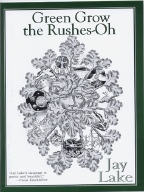Green Grow the Rushes-Oh
Jay Lake
Fairwood Press
US Chapbook Original
ISBN 0-974-65730-1
Publication Date: 04-15-2004
60 Pages; $6.99
Date Reviewed: 07-04-04
Reviewed by: Rick Kleffel © 2004

REFERENCES
COLUMNS
|
|
|
Green Grow the Rushes-OhJay LakeFairwood PressUS Chapbook OriginalISBN 0-974-65730-1Publication Date: 04-15-200460 Pages; $6.99Date Reviewed: 07-04-04Reviewed by: Rick Kleffel © 2004 |
|
|
REFERENCES |
COLUMNS |
Compact and complex are not easy to achieve outside the realm of poetry. Prose pulls the writer onward, beckons to the raconteur within, sinfully suggests we need more, more, more. Like Odysseus lashed to mast, Jay Lake hears the call of prose but resists the lure of more, more, more in his elegant and inspired cycle of short-short stories, 'Green Grow the Rushes-Oh'. In this rather daring experiment, a dozen beautifully sculpted pieces of prose lock together with the delicate precision of an astrolabe, a sextant of the soul.
Lake takes his inspiration from an old English counting song, the title of the chapbook. Each short-short story references a line from the song. But there's a lot more at work here than a series of short-shorts based around the numbers one to twelve. Each of the stories grows from the legend of the Green Man in England. Lake has assiduously researched his topic and his language. Each segment is beautifully written in a style that stays on the prose side of poetry, yet flows with the ease of great poetry. Given their lengths, the stories practically cry to be read aloud to your children at night.
The problem with that scheme is that you're liable to keep them awake with the subtle nightmares that Lake describes. The stories get under your skin like wood slivers, slivers that grow roots to interconnect with one another until something rather terrible threatens to burst forth. They're not horror stories, however, but tiny fables or fairy tales, pieces of legend that each seem whole on their own, but together add up to something even more complete, even more compelling.
Fairwood Press does an admirable job with the production aspects of this work. The cover illustration by Keith Boulger offers the proper balance of iconic simplicity and wood-grain detail. Within the book itself, parts of the cover image are reproduced with each short-short. The chapbook is printed on decently thick white paper in type that's a pleasure to read. Lake's an incredibly talented writer who apparently decided one day to do something that nobody else had done before, and he did it with amazing skill. No matter what your literary predilections are, you're likely to find 'Green Grow The Rushes-Oh' a delightful and disturbing prose creation.